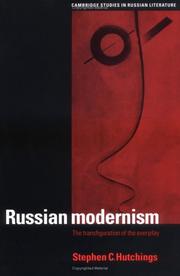| Listing 1 - 9 of 9 |
Sort by
|

ISBN: 041530668X 041554615X 1134400519 1280115408 0203426797 9780203426791 9780415306683 9780415546157 1134400500 9781134400515 9781280115400 Year: 2004 Publisher: London ; New York : RoutledgeCurzon,
Abstract | Keywords | Export | Availability | Bookmark
 Loading...
Loading...Choose an application
- Reference Manager
- EndNote
- RefWorks (Direct export to RefWorks)
This book explores how one of the world's most literary-oriented societies entered the modern visual era, beginning with the advent of photography in the nineteenth century, focusing then on literature's role in helping to shape cinema as a tool of official totalitarian culture during the Soviet period, and concluding with an examination of post-Soviet Russia's encounter with global television. As well as pioneering the exploration of this important new area in Slavic Studies, the book illuminates aspects of cultural theory by investigating how the Russian case affects general notions of liter
Russian literature --- History and criticism --- Literature and photography --- Motion pictures and literature --- Television and literature --- Ekphrasis. --- Literature and photography. --- Motion pictures and literature. --- Television and literature. --- Culture in motion pictures. --- Motion pictures --- Literature and television --- Literature --- Literature and motion pictures --- Moving-pictures and literature --- Photography and literature --- Photography --- Ecphrasis --- Art in literature --- Description (Rhetoric) --- History and criticism.

ISBN: 0511585551 0511005504 9780511005503 9780511585555 0521580099 9780521580090 9780521024495 0521024498 Year: 1997 Publisher: Cambridge : Cambridge University Press,
Abstract | Keywords | Export | Availability | Bookmark
 Loading...
Loading...Choose an application
- Reference Manager
- EndNote
- RefWorks (Direct export to RefWorks)
This book explores the unique way in which Russian culture constructs the notion of everyday life, or byt, and offers the first unified reading of Silver-age narrative which it repositions at the centre of Russian modernism. Drawing on semiotics and theology, Stephen C. Hutchings argues that byt emerged from a dialogue between two traditions, one reflected in western representational aesthetics for which daily existence figures as neutral and normative, the other encapsulated in the Orthodox emphasis on iconic embodiment. Hutchings identifies early 'Decadent' formulations of byt as a milestone after which writers from Chekhov to Rozanov sought to affirm the iconic potential hidden in Russian realism's critique of representationalism. Provocative, yet careful, textual analyses reveal a consistent urge to redefine art's function as one not of representing life, but of transfiguring the everyday.
Russian fiction --- Manners and customs in literature. --- Modernism (Literature) --- Crepuscolarismo --- Literary movements --- History and criticism. --- 19th century --- History and criticism --- 20th century --- Manners and customs in literature --- Russia --- Soviet Union --- Arts and Humanities --- Literature
Book
ISBN: 1000538214 0429293062 0367263904 Year: 2022 Publisher: London ; New York, New York : Routledge,
Abstract | Keywords | Export | Availability | Bookmark
 Loading...
Loading...Choose an application
- Reference Manager
- EndNote
- RefWorks (Direct export to RefWorks)
"This book presents a new perspective on how Russia projects itself to the world. Distancing itself from familiar, agency-driven International Relations accounts that focus on what 'the Kremlin' is up to and why, it argues for the need to pay attention to deeper, trans-state processes over which the Kremlin exerts much less control. Especially important in this context is mediatization, defined as the process by which contemporary social and political practices adopt a media form and follow media-driven logics. In particular, the book emphasizes the logic of the feedback loop or 'recursion', showing how it drives multiple Russian performances of national belonging and nation projection in the digital era. It applies this theory to recent issues, events and scandals that have played out in international arenas ranging from television, through theatre, film, and performance art, to warfare"--
Mass media policy. --- Nationalism --- Russia (Federation) --- Foreign relations. --- Cultural policy. --- Mass media --- Mass media and state --- State and mass media --- Communication policy --- Government policy --- Foreign relations
Book
ISBN: 1283143178 9786613143174 1443831050 9781443831055 9781443828864 1443828866 9781283143172 6613143170 Year: 2011 Publisher: Newcastle upon Tyne : Cambridge Scholars,
Abstract | Keywords | Export | Availability | Bookmark
 Loading...
Loading...Choose an application
- Reference Manager
- EndNote
- RefWorks (Direct export to RefWorks)
Changing attitudes to Islam profoundly influence political cultures and national identities, as well as policies regarding immigration, security and multiculturalism. Given that the majority of relevant scholarly works have either adopted monocultural perspectives, or approached Islam in its general, non nation-specific dimension, the need for in-depth, multi-nation studies is urgent. Islam itself, and responses to its rise, are becoming increasingly internationalised. It is therefore importa...
Islam and world politics. --- Islamophobia. --- Islamic fundamentalism. --- Islam --- Relations. --- Social aspects.
Book
ISBN: 9780415419079 0415419077 9780203091630 9781135277871 9781135277918 9781135277925 9780415590501 Year: 2009 Publisher: London ; New York : Routledge,
Abstract | Keywords | Export | Availability | Bookmark
 Loading...
Loading...Choose an application
- Reference Manager
- EndNote
- RefWorks (Direct export to RefWorks)
Television and politics --- Television broadcasting of news --- Télévision et politique --- Téléjournaux --- 316.774 --- Massamedia--(communicatiesociologie); technologische aspecten zie {659.3} --- 316.774 Massamedia--(communicatiesociologie); technologische aspecten zie {659.3} --- Télévision et politique --- Téléjournaux --- Television broadcasting --- Television coverage of news --- Television journalism --- Television news --- Broadcast journalism --- Politics and television --- Political science --- News --- Political aspects

ISBN: 1134400586 1280289473 9786610289479 020301104X 0203236203 9780203011041 6610289476 9780415306676 0415306671 0415306671 9781134400539 9781134400577 9781134400584 9780415546126 1134400578 Year: 2005 Volume: 18. Publisher: London : RoutledgeCurzon,
Abstract | Keywords | Export | Availability | Bookmark
 Loading...
Loading...Choose an application
- Reference Manager
- EndNote
- RefWorks (Direct export to RefWorks)
Providing many interesting case studies and bringing together many leading authorities on the subject, this book examines the importance of film adaptations of literature in Russian cinema, especially during the Soviet period when the cinema was accorded a vital role in imposing the authority of the communist regime on the consciousness of the Soviet people.
Film adaptations. --- Russian literature --- Motion pictures and literature --- Literature and motion pictures --- Moving-pictures and literature --- Literature --- Adaptations, Film --- Books, Filmed --- Filmed books --- Films from books --- Motion picture adaptations --- Motion pictures --- Film adaptations --- Adaptations --- Adaptations cinématographiques --- Littérature russe --- Cinéma et littérature --- Film and video adaptations. --- Adaptations cinématographiques et télévisées
Book
ISBN: 1135277915 1135277923 1282153390 9786612153396 0203091639 Year: 2009 Publisher: London ; New York : Routledge,
Abstract | Keywords | Export | Availability | Bookmark
 Loading...
Loading...Choose an application
- Reference Manager
- EndNote
- RefWorks (Direct export to RefWorks)
This book examines television culture in Russia under the government of Vladimir Putin. In recent years, the growing influx into Russian television of globally mediated genres and formats has coincided with a decline in media freedom and a ratcheting up of government control over the content style of television programmes. All three national channels (First, Russia, NTV) have fallen victim to Putin's power-obsessed regime. Journalists critical of his Chechnya policy have been subject to harassment and arrest; programmes courting political controversy, such as Savik Shuster's Freedom of Spee
Book
ISBN: 9780415419017 9780203886625 0415419018 9781134112340 9781134112388 9781134112395 9780415674874 Year: 2008 Publisher: New York, NY : Routledge,
Abstract | Keywords | Export | Availability | Bookmark
 Loading...
Loading...Choose an application
- Reference Manager
- EndNote
- RefWorks (Direct export to RefWorks)
Mass media --- Mass media and culture --- Médias --- Médias et culture --- Political aspects --- Aspect politique --- Russia (Federation) --- Russie --- Politics and government --- Social conditions --- Politique et gouvernement --- Conditions sociales --- Massamedia--(communicatiesociologie); technologische aspecten zie {659.3} --- 316.774Massamedia--(communicatiesociologie); technologische aspecten zie {659.3} --- 316.774 Massamedia--(communicatiesociologie); technologische aspecten zie {659.3} --- 316.774
Book
ISBN: 9781789620887 1789620880 9781789620870 1789620872 Year: 2020 Publisher: Liverpool Liverpool University Press
Abstract | Keywords | Export | Availability | Bookmark
 Loading...
Loading...Choose an application
- Reference Manager
- EndNote
- RefWorks (Direct export to RefWorks)
Transnational Russian Studies offers an approach to understanding Russia based on the idea that language, society and culture do not neatly coincide, but should be seen as flows of meaning across ever-shifting boundaries. Our book moves beyond static conceptions of Russia as a discrete nation with a singular language, culture, and history. Instead, we understand it as a multinational society that has perpetually redefined Russianness in reaction to the wider world. We treat Russian culture as an expanding field, whose sphere of influence transcends the geopolitical boundaries of the Russian Federation, reaching as far as London, Cape Town, and Tehran. Our transnational approach to Russian Studies generates new perspectives on the history of Russian culture and its engagements with, and transformation by, other cultures. The volume thereby simultaneously illuminates broader conceptions of the transnational from the perspective of Russian Studies. Over twenty chapters, we provide case studies based on original research, treating topics that include Russia's imperial and postcolonial entanglements; the paradoxical role that language plays in both defining culture in national terms, and facilitating transnational communication; the life of things 'Russian' in the global arena; and Russia's positioning in the contemporary globalized world. Our volume is aimed primarily at students and researchers of Russian Studies, but it will also be relevant to all Modern Linguists, and to those who employ transnational paradigms within the broader humanities.
National characteristics, Russian --- Transnationalism --- Russia (Federation) --- Civilization.
| Listing 1 - 9 of 9 |
Sort by
|

 Search
Search Feedback
Feedback About UniCat
About UniCat  Help
Help News
News